Frequently Asked Questions
- Is it possible to learn to drive before the age of 17?
- May I drive on a dual carriageway with a provisional licence?
- May I start taking lessons before passing my theory test?
- What is the probationary period?
- What is Pass Plus?
- What documents do I need to bring for my driving test?
- May anyone accompany me on my test?
- May I take my driving test in an automatic car?
- May I use my own car for the test?
- How do I cancel or change my practical test?
- How long will the practical test take?
- Do examiners have a quota of passes and fails?
- Will I fail if I cross my hands on the steering wheel?
- Will I fail my test if I make just one mistake?
- Who do driving instructors work for?
- How much does learning to drive cost?
Is it possible to learn to drive before the age of 17?
You may learn to drive on private land before the age of 17. You may apply for a provisional licence from the age of 16. These are the minimum ages for driving on public roads in the UK:
- 16: invalid carriages and mopeds;
- 17: cars, motorcycles and agricultural tractors;
- 21: larger vehicles such as minibuses and commercial vehicles.
May I drive on a dual carriageway with a provisional licence?
With your provisional licence you may drive - with or without dual-controls, on all roads - including dual-carriageways, and with dual-controls, on motorways.
May I start taking lessons before passing my theory test?
Yes. Experience of driving on the roads will help you understand the questions in the theory test. You must pass the theory test before being allowed to book the practical test.
What is the probationary period?
If you acquire six or more penalty points on your licence during the first two years after passing your driving test, your licence will be revoked.
You will be treated as though you had never driven a car. You will need to start from the beginning: apply for a provisional licence, drive with L plates, and take the theory and practical tests again.
What is Pass Plus?
Pass Plus is a course of further tuition covering environments and skills which you might not have covered much or at all during your training, such as motorways and country lanes. These environments can be dangerous for you and others if you are unprepared for them. Pass Plus was organised by the government in conjunction with insurers who would offer a discount, but:
- Any discount is off only your first year of insurance and as a return on your investment in extra tuition it might be less than the cost of the tuition.
- Not many insurers participate, and those which do might be more expensive anyway.
- They might find some way of obliging you to stay with them after the first year.
- They might increase your second year’s premium substantially to recover the difference, whereas you would normally expect to obtain a discount off your succeeding years if you have not made any claims. This is known as No Claims Bonus, and begins at 10% discount.
- It is not necessary to take a Pass Plus course to obtain the further development of your skills. Any driving instructor can offer you further training in environments which you might not have covered before your test. The motive for further development should be that of increased safety.
What documents do I need to bring for my driving test?
You must bring your driving licence.
Although the DVSA tell you to bring your Theory Test Certificate, you would not be able to obtain a Practical Test appointment without the certificate number, so, in practice the examiners do not ask to see it.
In case there is an admin mix–up, it is advisable to bring evidence of your appointment — perhaps on your phone or printed out.
If you have mislaid your licence or your certificate, you should contact the Driver and Vehicle Licensing Agency as far as possible in advance of your test appointment. Replacement driving licences can take two weeks or more to arrive.
You may download a document I have prepared, called ‘Practical Test Advice’ (PDF: 52 KB), which contains useful information.
May anyone accompany me on my test?
You may bring a friend or your instructor, or an interpreter if you need one. The other person must not assist your driving or interfere with the test.
The examiner will ask whether you want your instructor to both accompany you and listen to the debrief at the end of the test. Whilst you can say yes to both, you need to ask yourself this question “If I still need my instructor at this point, should I be here?” This is something which you should discuss in advance with your instructor.
May I take my driving test in an automatic car?
You may, but you should be aware of the following:
- If you pass your test in a car with an automatic transmission, that is the only type of car your licence will allow you to drive without supervision.
- An automatic licence functions as a provisional licence if you drive a car with a manual gearbox, and you will need to be supervised by someone who has the relevant licence.
- If you pass your test in a manual car, your licence will allow you to drive both manuals and automatics without supervision.
May I use my own car for the test?
You may use your own car, provided that it is roadworthy and that you are insured to drive it; some types - such as Smarts and soft-tops, are not permitted, and there must be a seat in the back, complete with a seat belt, and which is suitable for a supervising examiner to sit on. If in doubt, check on the DVSA site. There are certain other requirements; for example, the car must have a second rear view mirror, set up for the examiner’s use. A driving instructor’s car will fulfil all the requirements.
Domestic car insurance does not include cover for driver training or for the driving test. If you are thinking of having private practice or paying for tuition or taking the practical test in a car which is not an instructor’s car, you should ask the insurer about it. At the driving test you shall be required to sign a declaration that the car is correctly insured for the driving test — if you make a false declaration you could face prosecution. To insure a private car for the test can be more expensive than the fee which an instructor charges for the use of their car.
How do I cancel or change my practical test?
You may do this online. You will need any two of these three items:
- the number of your provisional licence,
- the number of your theory test pass certificate,
- and your practical test reference number.
Any changes made within three working days of your appointment will require the payment of a new fee. Saturdays count as working days.
If your test is cancelled due to circumstances beyond your control, such as exceptional weather, you will not need to pay a new fee. Notification of a new appointment will normally be sent to you within three working days.
How long will the practical test take?
The practical test for car drivers normally takes about 40 minutes.
The extended test, for those convicted of a serious driving offence, normally takes about 70 minutes.
Do examiners have a quota of passes and fails?
No. If you are good enough, you will pass, no matter how many other candidates have passed. Likewise, if you drive poorly, you will fail even if everyone else that day has failed.
Will I fail if I cross my hands on the steering wheel?
The driving examiner assesses and marks the consequences of what you do, so, not push–pulling the steering is not in itself a fault. You are actually more at risk from the airbag inside the steering wheel. Push–pull steering keeps your hands and arms clear of the airbag.
Will I fail my test if I make just one mistake?
That depends on the severity of the mistake. There are three categories of driving mistake:
- A driving fault is a minor error which results in no danger to yourself or others. You may have up to and including 15 minor errors and pass provided that there are not several of those errors in one skill, which would show an obvious weakness.
- A serious error results in potential danger to yourself or others. The examiner would not normally intervene but you would not pass the test — even if there is only one such error.
- A dangerous error results in actual danger to yourself or others, in which case the examiner would need to intervene to prevent an accident. Of course, you would not pass the test.
The Driving and Vehicle Standards Agency recognises that even very good drivers make the occasional minor mistake. You do not need to be perfect to pass your driving test!
Who do driving instructors work for?
All driving instructors are self–employed. They are licensed by the government’s Driving and Vehicle Standards Agency (an agency of the Department for Transport) which also carries out regular inspections of instructors’ teaching standards to check that they are teaching safely and correctly. Qualified driving instructors display a green licence inside the front screen of their car.
Most driving instructors work as ‘sole traders’ which means working alone and without employing anyone else to do the teaching. Some driving instructors who struggle to find work take out franchise contracts with big companies such as the AA, BSM, RED, Bill Plant, and others but they do not work for those companies — in other words, they are not employed by them — they are subcontractors.
Although those companies advertise themselves as driving schools, they do not give driving lessons — the instructors do, so, those companies are not really driving schools — they are learner driver referral agencies. You — the customer, are the employer of driving instructors. You hire and fire them. When you pass your driving test and you want to sing the praises of your instructor, you would do better to praise your instructor — not the driving school, otherwise, the driving school receives all the credit and your instructor receives nothing in return. If someone says “I passed with BSM (or other)” they actually did not — they passed with their instructor. BSM (or other) did not teach them — their instructor did.
Until the 1980s driving instructors were employed by driving schools. Now, all driving instructors are self-employed, either as sole traders or as franchisees.
The problem with franchising is that since the ‘driving school’ makes its money from franchise fees paid by instructors — sometimes hundreds of £s per week, the ‘driving school’ advertises for more and more instructors to take out franchises, even though there are insufficient numbers of new customers for so many instructors — especially since fewer of us are learning to drive. This is why we see so many low–priced offers for driving tuition. Low tuition fees, however, produce low quality tuition, since the instructor has to reduce their service to minimum standards. This leads also to low standards of instructors. The employment turnover in this business is high — many instructors go out of business.
If you want to learn to drive safely and enjoy the learning it is better for you to pay good fees to a good instructor. Ask an instructor how they can help you to achieve your goal. Ask them which DSA grade they have. If you immediately ask an instructor how much they charge, they might think that you are interested only in how much it costs and not in what the instructor can do for you. You shouldn’t expect something for nothing — this service is expensive for the instructor to deliver. There has to be give and take — if you want to learn to drive, you should accept that it is not free and it is not cheap.
How much does learning to drive cost?
Firstly, the licence:
Driver and vehicle licensing is provided by the Driver and Vehicle Licensing Agency (DVLA). To be allowed to drive on the public roads you must apply to the DVLA for a UK Provisional Driving Licence. The cost of a Provisional Licence is £34.00 (online). You may begin driving under supervision when you receive the Provisional Licence.
Secondly, the learning:
The cost of tuition depends not so much upon how much you pay but upon how you learn — you are unique — everyone learns in their own way, some learn more quickly than others. See the chart issued by the Driving and Vehicle Standards Agency (DVSA) showing statistics on the average number of hours drivers take before passing their practical test. The cash cost of tuition depends upon who coaches you and what financial arrangements you agree with them. Driving tuition fees vary — you could expect to pay between £30 and £50 per hour for tuition. As with most goods and services, the best normally costs more. You can easily find ‘cheap’ driving lessons advertised but, beware — ‘cheap’ means low quality, and might not be full hours. Most suppliers offer discounts for block payments in advance.
Thirdly, taking and passing the tests:
Driver testing is provided by the DSA. They contract out the Theory Test, and Government–appointed examiners conduct the Practical Tests.
The cost of the Theory Test is £23.00. You must pass a Theory Test before applying for a Practical Test. The cost of the Practical Test is £62.00 (£75.00 for w/e and bank holidays) and on the day of your Practical Test you also pay your tutor a fee for their tuition on the day and the use of their car for your test (this could amount to the equivalent of 3 hours of their time).
Finally, totalling up the cost:
If you include further development after passing the practical test, for instance learning on motorways and country lanes and total darkness out of town, you would do well to budget between £1,700.00 and £2,000.00.
Testimonial
“I can warmly recommend Alan to prospective drivers of all ages and abilities since I must be one of the most reluctant drivers ever — having twice before during my younger years given up, and yet, with Alan’s inexhaustible patience and encouragement I passed — finally!”
Gerald Killingworth
Contact Alan
- Phone or Text
- 07739 508 398
To keep costs down and keep your fees realistic Alan does not employ staff. You may need to leave a voice message when you call, or you may prefer to send a text message or an email.
We Passed!
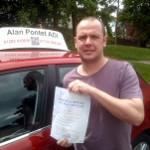
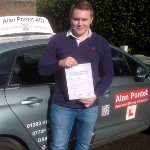
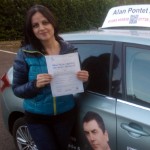
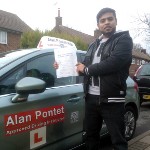
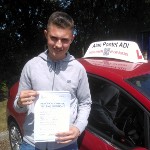
- Conditions and Guarantee
- Downloads
- Content: copyright © Alan Pontet Driving Tuition 2013–2024
- Website by Lab 99 Web Design in Crawley, Sussex
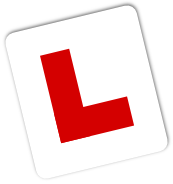


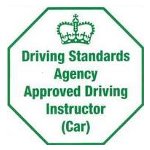

Follow Alan: